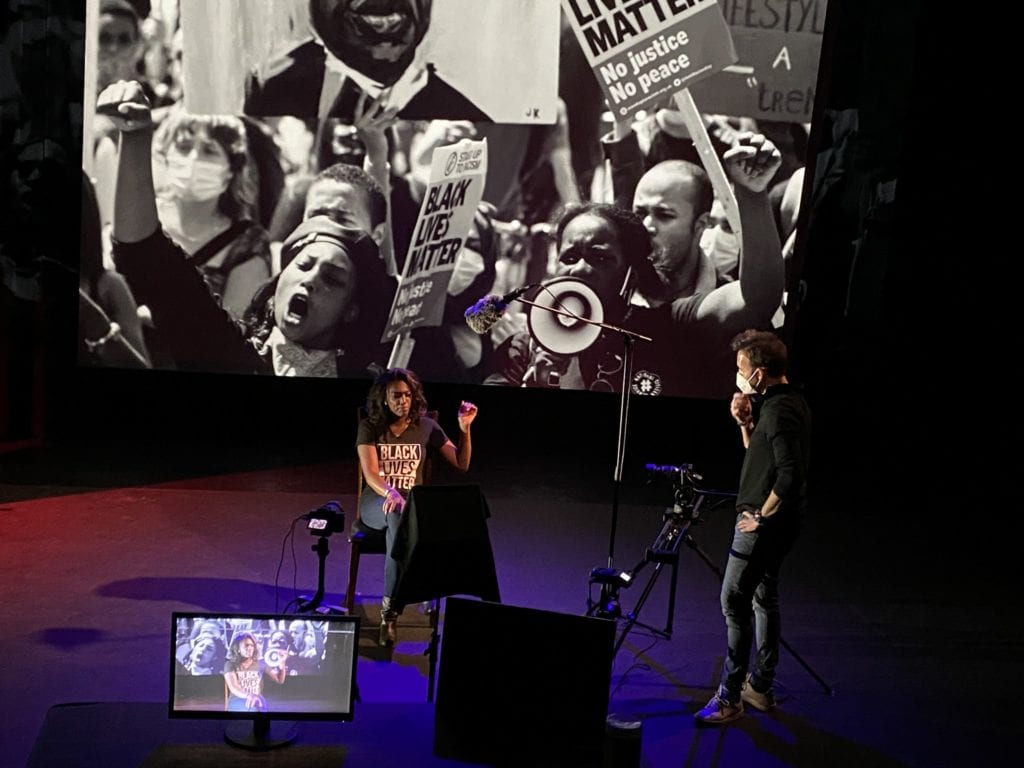
A virtual work about the year that was and what ails us still
By Lisa Kennedy (Read the original.)
One of the most gentle (but profoundly painful) moments in the Boulder Ensemble Theatre Company’s omnibus piece “CO2020” comes when musician Jukka La Pert Pawley talks about how the killing of Elijah McClain (a fellow violinist) hit him and what he did to mourn the 23-year-old whose death put Aurora and the Denver metro area on the nation’s ugly map of police-involved killings of unarmed Blacks.
He gathered fellow string players together for an impromptu concert in Aurora. They were playing Aaron Copland’s “Simple Gifts” when Aurora police began pepper-spraying and pushing those gathered.
Pawley portrays himself in BETC’s ambitious hybrid, virtual piece (available for viewing through April 18 at betc.org). So do actor-educator Ilasiea Gray, kindergarten teacher Sara Milbrath, activists Jazmine Pace and Colorado Poet Laureate Bobby LeFebre. Other real-life folks are inhabited by recognizable local performers, among them: Cajardo Lindsey, Sam Gilstrap, GerRee Hinshaw, Betty Hart, Lisa Young, Warren Sherrill and Adrienne Martin-Fullwood. And less known (to me) but exciting-to-see-at-work performers Maya Jairam, AJ Voliton, Lauren Sugihara and Augie Truhn.
This cast plays a multitude of Coloradans, some of who have leadership roles, and others we don’t know but recognize, in their shared aggravations and observations. They are faith leaders, community activists, health-care workers, police officers, parents, artists, teachers, non-profit leaders, business folk, public officials.
Last spring, the Boulder company had received a National Endowment of the Arts grant when the arts sector collapsed. Artistic director Stephen Weitz — who directed this piece — decided to repurpose the money and devise a piece that would address COVID-19 and its impact on Colorado’s citizens. But the year had so much in store for us all: social justice uprisings, a riven electorate, an economic cratering and deaths, so many deaths. “CO2020” embraced those twists.
It is no secret that one of the industries hardest hit when the coronavirus struck was the arts. So it shouldn’t come as a surprise that this piece, composed of more than 50 interviews of Coloradans of all stripes, doesn’t just reflect the wounds of those interviewed but also of the gifted theater professionals who created the piece. Heather Beasley, Jada Suzanne Dixon, Gray, John Moore (a former Denver Post writer), Lynde Rosario and Weitz comprise the team that wrestled the material into, if not a perfect piece of devised theater, a telling document of the time.
One reason Pawley’s presence works so well is that he shares a story. It’s the closest to the storytelling dictum of “show don’t tell” as “CO2020” gets.
There are a few other bravura moments. Voice-over accounts of personal reactions to the killing of George Floyd timed to the 8 minutes and 46 seconds (although that number has now been clarified to 9 minutes and 29 seconds in court documents) that Derek Chauvin had his knee on Floyd’s neck. (A digital clock slowly ticks down the seemingly interminable seconds.) Milbrath’s moving account of how she and her husband explained to their young daughters the video of that killing in Minneapolis.
More than once, a character calls for better listening, especially around social justice and systemic racism. But running nearly 2 hours, the show’s demand for deep attention might tax the most attuned therapist. That said, one of the vital lessons of listening well to these voices is that people often — in the span of two sentences even — say seemingly contradictory things. It’s proof that talking isn’t all about scoring points; it’s also about working through. And there needs to be room for that.
Sadly, there isn’t a lot of wit here. The reasons for this dearth in humor — even of the gallows variety, of which Americans can be rather deft — may be the time in which the interviews were conducted. It also may be the sincerity of the creative team.
Filmmaker Ray Bailey edited the hours of performances with a care that keeps what is essentially people sitting on stage talking visually appealing. Among the other gestures used to break up the march of talking heads were news footage; and black-and-white intertitles, some with racially conscious haiku. One example of lovely visual material here is the use of Dr. Sarah Rowan’s Women of Color on the Frontlines selfie-into-portraits project. The show also has interstitial footage that looks like stock images (some of it is) from an ad agency dedicated to celebrating the “Faces of Diversity.” Yes, these scenes are in keeping with the inclusionary aims of the piece, they also seem to rob it of an authentic sense of place.
While the “CO” of the title stands for Colorado, it’s not easy to glean a sense of place. Is this a function of the questions put to the interviewees? Or a sign of how much the virus, racial injustice, economic disparities — and television — bound us as a nation, more than as denizens of a state?
But as the saying goes (sort of), I come not to pick apart this fraught time capsule of a historic, shattering year, but to celebrate it. So you need to know that there is another group of characters who play themselves — and do so with sweet aplomb. They are young, aware, thoughtful, wounded but also touchingly wise kids who grapple with the same themes as the adults. There are a few too many to name, but they all deserve applause. In a culminating section about respecting difference, wee Lovelyn Belle says by way of explanation, “You like gorillas and I like flamingos.”
From the mouths of babes.
